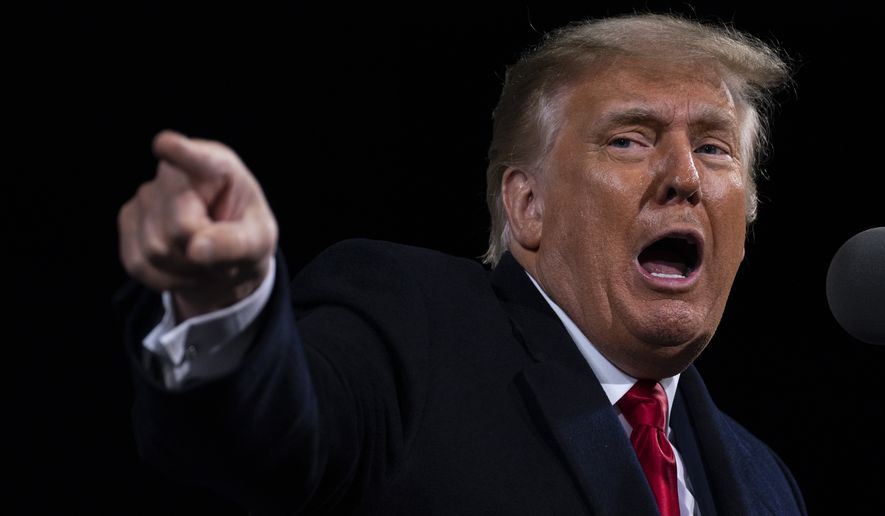Big Tech’s censorship of President Trump and other conservatives since last week’s storming of the U.S. Capitol provoked backlash Monday, with their stocks falling and rebukes from political figures around the world.
After Twitter and Facebook permanently banned Mr. Trump from their platforms, Apple, Google and Amazon soon followed by silencing thousands of his supporters. They cut off the new social media platform Parler, which has become a refuge for pro-Trump content.
Investors got jitters about the crackdown. Shares of Apple, Google, Amazon and Facebook all dropped roughly 2%. Twitter was down more than 6%.
Parler CEO John Matze decried the punishments as “a coordinated attack by the tech giants to kill competition in the marketplace.”
Parler also has sued Amazon in a Seattle-based federal court. It accuses the online sales behemoth of violating antitrust laws to harm Parler and help Twitter. It also says Amazon breached its contract by not giving 30 days’ notice before terminating Parler’s account.
Amazon and Parler did not return requests for comment about the dispute Monday.
Mr. Matze was bracing for the long-term disruption of his online platform.
In a Monday interview with Fox Business, Mr. Matze said the company “may even have to go as far as buying and building our own data centers and buying up our own servers.”
The censoring of political speech is not considered a violation of the First Amendment when done by private businesses rather than the government.
Still, the bans set off alarms for foreign leaders, including some who have sparred with Mr. Trump on other matters.
A spokesman for German Chancellor Angela Merkel said “the chancellor considers it problematic that the accounts of the U.S. president have now been permanently blocked.”
Mexican President Andres Manuel Lopez Obrador said he didn’t like anybody being censored or blocked on Twitter or Facebook.
“I don’t agree with that. I don’t accept that,” he said. “A court of censorship like the Inquisition to manage public opinion: This is really serious.”
Russian opposition advocate Alexei Navalny, an outspoken critic of the Kremlin, called the social media crackdown “an unacceptable act of censorship.”
Mr. Navalny said in a Twitter post that Big Tech’s knee-jerk reaction was “based on emotions and personal political preferences” that boded poorly for freedom of speech everywhere.
The American Civil Liberties Union, which has often sued the Trump administration, chimed in to warn about the “unchecked power” of tech giants.
Constitutional law scholars agreed that widespread censorship by companies that dominate the marketplace is dangerous.
“It’s just very disturbing that they are trying to control the debate entirely,” said Russell Weaver, a law professor at the University of Louisville.
The crackdown could add momentum to the push to revoke internet platforms’ legal liability protection for content their users’ posts.
“I’m not sure they are going to be keeping that if they are aggressively controlling content,” Mr. Weaver said.
Social media companies such as Twitter and Facebook have had legal protection under Section 230 of the Communications Decency Act, which prevents the interactive platforms from being treated as a publisher or speaker, largely shielding them from legal battles.
Conservative lawmakers including Sen. Josh Hawley, Missouri Republican, and Sen. Ted Cruz, Texas Republican, have called for overhauling the protections of companies when they move to ban the free exchange of ideas.
Several Democrats also support rewriting Section 230.
Lawmakers have routinely hauled in CEOs from the major companies for hearings, but they haven’t beyond that. Many conservatives are frustrated over the unchecked freedom to discriminate against certain viewpoints.
Howard Wasserman, a law professor at Florida International University, said the way for people frustrated by censorship to push for change is through lawmakers because it is a policy issue, not a legal one.
He said Twitter and Facebook created forums, much like an “open mic,” so the companies can patrol speech.
Amazon and Apple, though, may need to be more neutral because they host apps such as Parler, which was recently removed.
“As a model of how we want public dialogue to look, maybe they should be bound by requirements of neutrality, but that is not the law right now, and that is unlikely to become the law,” he said.
The companies have said Mr. Trump and users on Parler advocated for the violence at the Capitol. Pro-Trump demonstrators turned violent and entered the building during a joint session of Congress, where lawmakers were certifying the 2020 election. Several people, including two Capitol Police officers, died after the rioting.
Ilya Shapiro, publisher of the Cato Institute’s Supreme Court Review, warned about government intervention and patrolling of companies — even those like big tech.
“We should be wary of giving more power to regulate private industry. If you don’t like how the CEOs of Twitter, Apple and Google regulate content, you won’t be too happy with Kamala Harris doing so,” he said.
• This article is based in part on wire service reports.
• Alex Swoyer can be reached at aswoyer@washingtontimes.com.




Please read our comment policy before commenting.